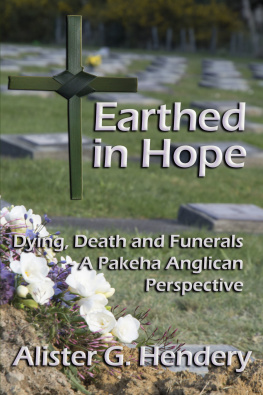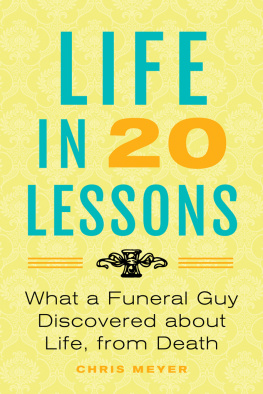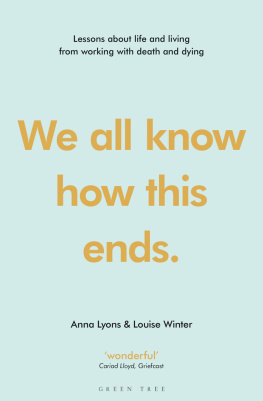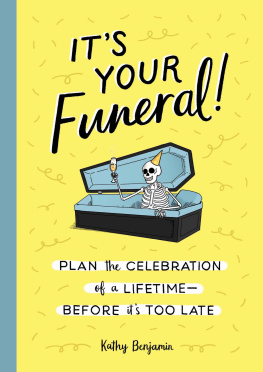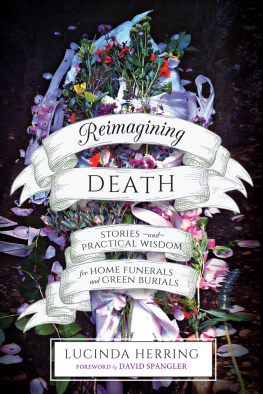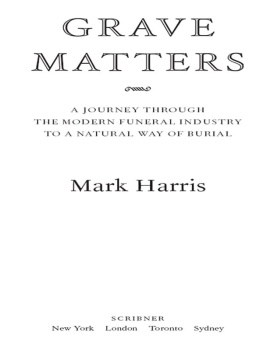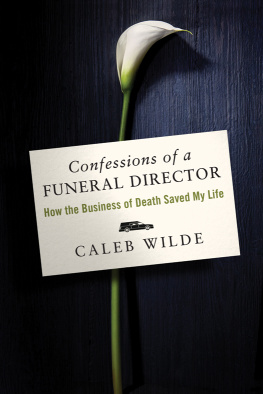Dying to meet you
Angjolie Mei | Sher Maine Wong
ISBN: 978-981-47-5729-4
First Edition: March 2017
2017 by Angjolie Mei
Cover Design by Yong Wen Yeu
Cover Photograph by Alecia Neo
Published in Singapore by Epigram Books
www.epigrambooks.sg
All rights reserved
Some names and identifying details have been changed to protect the privacy of individuals.
Table of Contents
For all who have lost a loved one
may you find solace in insight
and wisdom.
Introduction
M y clients are dying to meet me. Thats the clue I offer to strangers who ask me what I do for a living. Another witty one-liner that I sometimes throw out as a way of breaking the ice is: I have the best clients in the world because they never complain.
Im a funeral director. Some might think its bad luck to associate with someone of my profession, but the fact is that everyone will eventually need the kind of services I provide.
The number of deaths in Singapore has been on the rise since 960, and will not go down any time soon, given the countrys ageing population. About 5,700 Singaporeans died in 2005, and 9,800 in 205.
I have written this book, in part, because I want to lift the shroud of mystery that surrounds death in Singapore. There are misconceptions and ambiguity aplenty, but also a lot of curiosity about the topic.
When I take part in panel discussions as part of seminars, forums and talks, I am usually hit with a barrage of questions from the floor. People want to know what funeral directors do with the bodies of the dead, what to do when their loved ones die, and how the living should prepare for death. They are innately fascinated with death because it is not something encountered every day.
I also want to dispel stereotypes. Funeral directorspopularly called morticiansare a favourite feature in horror stories, and they are usually pale, grim, cadaverous men. In the past, when one thought of funeral directors in Singapore, the image that came to mind would be that of a Hokkien-speaking, chain-smoking middle-aged man in a T-shirt, who had ended up in what was thought of as a dead-end, pantang (inauspicious) job no one else wanted.
But funeral services have evolved, over time, from largely ritualistic ceremonies to meaningful, carefully curated events. In essence, funeral directors are event planners. The nitty-gritty of what I do starts when I get a call from a client whose family member has died. I help the family to organise the entire funeral event, from making sure the body looks presentable and acceptable, to booking venues for wakes and organising them, to helping family members pick out their loved ones cremains (cremated remains) after a funeral.
People often ask me why I chose to become a funeral director. I was not forced into my profession; I love my job. I view every funeral I do as a celebration of someones life. As we rejoice whenever babies are born, we should celebrate when people have completed their life journeysremember the things they have done, the people they have touched and the differences they have made.
I am one of a handful of certified funeral directors in Singaporeof which only a very small proportion are womenand the only certified funeral celebrant, which means that I am trained to organise funerals that reflect the personality and lifestyle of the deceased. The religion of the dead and their families also determines how a funeral is conducted. Apart from Hindu and Muslim funerals, I have organised funerals for Christians, Catholics, Buddhists, Taoists, Soka practitioners and freethinkers. My job is incredibly fulfilling, one in which I have learnt many life lessons through the funerals I have organised and from the interesting people I have met.
Becoming a funeral director as part of my own life journey is a tale in itself. I had never set out to become one. What I always say, when asked about my choice of profession, is that I didnt choose funeral directing. Funeral directing chose me. As a child, I was scarred by encounters with death. But when my father, Ang Yew Seng, a pioneer in the Singapore funeral industry, died in 2004, I had to quit my job and support my mother in a male-dominated industry.
It is also fitting that a funeral director who talks all day long about remembrance should write her own autobiography, perhaps to distribute at her own funeral one day.
As you read this book about my life as a funeral director, you will unavoidably think about death. But also, think about your life, make it count and make it last. Because I hope I will not have to meet you for a long time yet.
I Am Ang Yew Sengs Daughter
M y mother is a funeral director. My younger sister, Sarah, is an embalmer and she is married to a funeral director. Nearly my entire family, aside from my elder sister, who is an accountant, and my brother, who is still in school, works in the funeral industry.
At Sarahs wedding in 205, probably half of those from Singapores funeral industry were present. Many of the guests, chain-smokers who work in the industry, flooded the toilet for their smoke breaks, drawing the ire of the hotel manager who threatened to call the fire department upon witnessing the clouds of smoke in the loo.
While we make a living off death, and we do have a tendency to pore over obituaries, ours is a normal, happy, four-generation family with plenty of babies to play with at our social gatherings. We dont usually talk about work. At most, we exclaim about coincidences, like when I discovered that I had embalmed my mothers former teacher and organised her funeral. Or if someone I knew had died and I found out via our family WhatsApp group chat that my mother or brother-in-law was taking up the case, I might ask them to give a goodwill discount. My sister, when she was pregnant, was also allowed by our family to continue her embalming work well into her second trimester despite the superstition that expectant women should keep away from the dead. Her husband, mother and sister all needed her skills.
My siblings and I would likely have ended up in normal salaried professions, perhaps in office-bound jobs, sales or marketing, had it not been for my father, Ang Yew Seng. He was the second in a family of 0 children born to immigrants from China. In post-war Singapore, families were typically large, and children were not pampered or nurtured. My father, like most children in working-class families then, didnt stay long in school because he had to work to help feed his siblings. At 2, he started doing odd jobs, like selling bee hoon as a street hawker.
Fortuitously, his uncle, who had migrated from China, started a funeral business. My father decided to join him in the trade at a young age, making caskets by hand. In those days, when Singapore had enough land for people to be buried rather than cremated, the heavy caskets were painstakingly fashioned from actual tree wood. The tools he used are still kept in the family.
In the 970s, the government, realising that the dead were taking up space in land-scarce Singapore, started to clear cemeteries and redevelop the land by constructing roads and buildings. The biggest cemetery landowners at the time were the main Chinese clan associations, who altogether owned over ,000 acres of land.
The Chinese had to quickly get used to the idea of cremation. At the time, the Hindus were already cremating their dead. Muslims did not, as the practice is forbidden in Islam. Cremation, however, caught on amongst the Buddhists and Christians who, up till then, had mostly buried their dead.
Cremation called for a different sort of casket from those used in burials. It had to be light, and it had to burn easily. These could have been imported, but the Chinese Buddhists preferred caskets with traditional motifs, such as lotus flowers and swastikas. My father was an active volunteer at the Bright Hill Temple, also known as the Kong Meng San Phor Kark See Monastery, and the Reverend there suggested that he create thinner, lighter caskets with these motifs to support the push toward cremation. In response, he started his business, Ang Yew Seng Cremation and Undertaker, which was located at Thomson Road. The Reverend directed the temple devotees to my father to organise the funerals of their family members, and his business took off. He moved to Sin Ming Drive in 984 when the Singapore government took back the land where his first office was located, and the companys name was changed to Ang Yew Seng Funeral Parlour.



